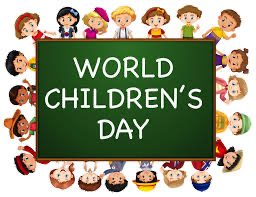World Children’s Day in the face of harmful global pandemic


Today, November 20 is the World Children’s Day.
There is no doubt 2020 World Children’s Day celebration is indeed a time to draw the attention of the world to what the harmful coronavirus pandemic has caused the rights of the child.
When children do not have the opportunity to reach their potentials as they grow into adulthood, it is not only the children but also all of society who suffer the consequences.
COVID-19 has made clearer than ever that it is fundamental for adults to recognize children’s special and distinct rights in order that the impact of the pandemic on all children, but particularly those who are already deprived and subject to discrimination and marginalization is minimized and to ensure that they are not pushed further behind.
According to a UNICEF report, there is global threats to child survival and health.
While the available evidence indicates the direct impact of COVID-19 on child and adolescent mortality to be very limited, the indirect effects of Covid 19 on child survival stemming from strained health systems, household income loss, and disruptions to care-seeking and preventative interventions like vaccination may be substantial and widespread.
READ ALSO: Vote us out if you’re tired of our faces, Lawan to Nigerians
According to a study covering 118 low- and middle-income countries by the Johns Hopkins Bloomberg School of Public Health, an additional 1.2 million under-five deaths could occur in just six months due to reductions in routine health service coverage levels and an increase in child wasting. Also an additional 1.2 million children and 56,700 mothers could die in 6 months due to the disruption.
More vulnerable children are suffering from malnourishment
More vulnerable children are becoming malnourished due to the deteriorating quality of their diets and the multiple shocks created by the pandemic.
Efforts to mitigate the transmission of COVID-19 are disrupting food systems, upending health and nutrition services, devastating livelihoods, and threatening food security.
Many parents and caregivers have lost their source of livelihood due to the impact of Covid 19
Reduced access to life-saving vaccines
In the report, every year, vaccines save an estimated 2 to 3 million lives, but COVID-19 threatens to roll back decades of progress made in reducing preventable child deaths by hindering access to these life-saving services.
According to new data, nearly 14 million children did not receive any vaccines in 2019. Additionally, almost 6 million children received some but not all vaccines required for full protection against many life-threatening diseases.
With COVID-19 putting enormous pressure on already weak or overstretched health systems, the number of unvaccinated and under-vaccinated children is expected to increase, exacerbating existing inequities and putting the lives of many children at serious risk of disease or death.
Due to COVID-19 measures, approximately 80 million children under the age of 1 in at least 68 countries may miss out on receiving life-saving vaccines
More than 94 million children are at risk of missing measles vaccines because of paused measles campaigns in 26 countries due to efforts to control COVID-19 (as of November 2020), threatening to exacerbate ongoing measles outbreaks. Worldwide, cases of measles surged to nearly 870,000 in 2019, the highest number of reported cases in the past 23 years.
And global measles deaths have climbed nearly 50 percent since 2016, claiming an estimated 207,500 lives in 2019 alone. Measles outbreaks occur when people are infected in communities that are not sufficiently protected with the measles vaccine because they are not vaccinated or are undervaccinated.
A statement by Tedros Ghebreyesus, director-general, WHO, said “while health systems are strained by the COVID-19 pandemic, we must not allow our fight against one deadly disease to come at the expense of our fight against another. Measles is entirely preventable, but success requires 95 per cent of children to be vaccinated on time with two doses of measles-containing vaccines (MCV1 and MCV2)”.
Threat to the decades-long progress in the fight against HIV
There is also threat to the decades-long progress in the fight against HIV. New HIV infections among young children have decreased by half in the last decade, however, service disruptions due to COVID-19 could reverse these gains.
The number of new HIV infections is projected to nearly double if 100 per cent of the population loses access to treatment services over a six-month period, and the number of paediatric deaths will similarly soar. An additional 124,000 children could be infected with HIV if prevention services are disrupted for 6 months
Risks for child safety.
The COVID-19 crisis could lead to the first rise in child labour after 20 years of progress. Child labour decreased by 94 million since 2000, but that gain is now at risk.
Among other impacts, COVID-19 could result in a rise in poverty and therefore to an increase in child labour as households use every available means to survive. A one percentage point rise in poverty could lead to at least a 0.7 per cent increase in child labour in certain countries.
Pushing more households into multidimensional poverty.
Approximately 150 million additional children are living in multidimensional poverty – without access to these essential services – due to the COVID-19 pandemic, according to the analysis jointly carried out by Save the Children and UNICEF.
Using data on access to education, healthcare, housing, nutrition, sanitation and water from more than 70 countries, the authors find that around 45 per cent of children were severely deprived of at least one of these critical needs before the coronavirus pandemic even hit.
And although the current data paint a dire picture, the situation for children living in multidimensional poverty is likely to worsen unless national governments and the international community step up to soften the blow.
Children’s learning was in crisis, and the pandemic has only sharpened these inequities, hitting schoolchildren in poorer countries particularly hard. Globally, many schools lack the resources to invest in digital learning, and many children from poorer households do not have internet access.
In the past, school closures have led to an increase in child marriage and child labour which often prevent children from continuing their education.
As the world celebrates Universal Children’s day,
UNICEF and partners are calling on governments to adopt a Six-Point Plan to Protect Children globally.
– Ensure all children learn, including by closing the digital divide.
– Guarantee access to health and nutrition services and make vaccines affordable and available to every child.
– Support and protect the mental health of children and young people and bring an end to abuse, gender-based violence, and neglect in childhood.
– Increase access to clean water, sanitation and hygiene and address environmental degradation and climate change.
READ ALSO: I want Nigeria to be seen as country that does not tolerate corruption – Buhari
– Reverse the rise in child poverty and ensure an inclusive recovery for all.
– Redouble efforts to protect and support children and their families living through conflict, disaster and displacement.
This is a call to the Nigeria leaders to up their game in showing interest in the wellbeing of every child the more. Corruption in every sector that affects interest of Nigeria children should stop. A case where payments to some federal colleges for school feeding in the sum of N2.67 billion during lockdown when the children are not in school ended up in personal accounts does not speak well of the nation.
The government should be concerned about thousands of children who are orphans because of banditry ravaging the Northern part which is fast spreading to every part of the country.
The orphaned children, due to their dire situation of pain, trauma, depression, lack of care, hunger, abject poverty-stricken life, the helplessness of their widowed mothers to fill the gaps as created by an unforeseen situation left by their deceased fathers, lack of compassion from society from whom they expect succour and compassion but feel ignored, will undoubtedly, become easy prey and willing tools in the hands of criminal elements that pay them a pittance and recruit them.
The ranking of Nigeria as having the highest number of out of school children in the world with 13.2Million up from 10.5million in the Demographic Health Survey conducted by UNICEF published in 2015 calls for a serious concern because the world will not solve Nigeria problem if it does not solve it by itself.
The post World Children’s Day in the face of harmful global pandemic appeared first on Vanguard News.





